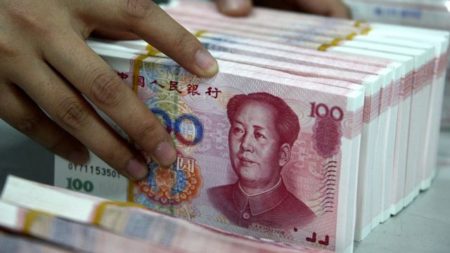By Peter Ward September 30, 2016
Close Up on the Yuan

Yuan. ©Junjiewu99, Creative Commons Attribution-Share Alike 4.0
On October 1, the Chinese yuan will receive a boost when it enters the International Monetary Fund’s Special Drawing Rights (SDR) basket of reserve currencies, placing it alongside the yen, dollar, euro and pound. But just how important is the yuan to global business? Bloomberg News looked into the data this week.
The main graphic shows that China’s currency is not widely used around the world. Although China trade accounts for $4 trillion in global imports and exports, the Chinese yuan only only accounts for 1.8% of global currency use. But this will likely shift with the inclusion of the yuan in the IMF’s SDR basket, which will give banks and fund managers greater confidence in its stability and likely spur them to purchase more Chinese assets. Some estimates suggest inflows of $1 trillion over the next five years. The onshore bond market in China is expected to benefit significantly.
Typically a reserve currency must be freely traded, and in that sense the yuan is not quite there yet. But for now, the IMF has not pressured China’s central bank to change its approach to the currency.
“The People’s Bank of China is often suspected of intervening in the market to nudge its exchange rate one way or the other. The central bank also limits onshore daily moves to 2 percent on either side of a fixing that it sets. Then there are capital controls, which restrict the ability to move money out of the country,” write reporters Robin Ganguly and Cedric Sam, who coauthored the piece.
Facebook Data Investigation Launched

Mark Zuckerberg, Facebook founder. ©JD Lasica
How much does your social media platform know about you? That’s the question ProPublica asked as it launched an investigation this week to reveal the inner workings of algorithms that dictate the way data is collected by Facebook and used for advertising.
The publication has previously published investigations into how algorithms are used to identify potential future criminals and how Amazon uses algorithms for a competitive advantage, offering special deals to consumers who are shown to be shopping for a particular product elsewhere.
ProPublica is launching its latest investigation into Facebook by asking readers to download a tool that tells people how much Facebook knows about them and then asks for feedback from readers about how accurate that data is. No identifying details will be collected but reporters will use the data they collect for an investigative report to be published later.
Facebook has particularly detailed dossiers on each of its 2 billion members, and collects information every time someone likes a post, tags a photo or updates information on their profile. When users browse the web while logged into Facebook, the company collects information about any pages they visit that contain Facebook sharing buttons. Use of Instagram and WhatsApp, both owned by Facebook, also contributes to the dossier.
Can Aviation Reduce Emissions?

Tobacco field. ©Kevinbercaw, Creative Commons Attribution-Share Alike 3.0
The aviation industry is one of the biggest polluters on the planet, and is projected to account for 22% of all emissions by 2050. A recent feature published by The Guardian on Tuesday looked into how airlines can change that, and what progress has already been made.
One potential solution is offered by Project Solaris, which has proposed using fuel extracted from nicotine-free tobacco crops on a wide scale, for both fuel and animal feed. The crops are grown on farms that used to grow regular nicotine tobacco, but have suffered from declining demand. A test flight using this fuel and backed by Boeing, KLM, South African Airways, the Dutch government and others recently ran from Johannesburg to Cape Town.
Project Solaris hopes to produce millions of liters of the fuel in southern African countries like South Africa and Malawi. The tobacco-based fuel costs a lot more than regular fuel, but is still being considered by airlines that have committed to reducing CO2 emissions.
Biofuel has powered around 2,500 successful flights so far, but the search is still underway for a cost-effective solution, as most biofuels are very expensive. “Oslo airport now supplies airlines with alternative fuels for regular daily flights. Los Angeles is following and we expect John F Kennedy and other New York airports to stream from 2019,” Michael Gill, executive director of the Air Transport Action Group, a coalition of aviation industry companies, told The Guardian.
But there are no plans in place to produce biofuels on a large enough scale to put a dent in the aviation industry’s emissions. Instead, the sector is pinning its hopes on the UN global carbon offset scheme, which could see other industries cut their emissions to allow aviation to continue to grow.
One aspect of the proposed UN offset scheme is to allow the aviation industry to continue its emissions levels but offset that by reducing deforestation. This has been met with criticism. “Not only would such a scheme allow the aviation sector to continue expanding and to continue burning fossil fuels, it would rely on carbon being stored in forests. Yet as climate change worsens, the risk of these forests burning and returning the carbon to the atmosphere is increasing,” Chris Lang, editor of Redd Monitor told The Guardian.
Deutsche Bank Worries Deepen

Frankfurt Deutsche Bank headquarters. ©Epizentrum, Creative Commons Attribution-Share Alike 3.0
Deutsche Bank is in the global spotlight. The bank was handed a $14 billion fine by the U.S. Department of Justice last week, for mis-selling mortgage securities in the days before the financial crisis of 2008 and 2009.
In January, the bank posted its first full-year loss since 2008, and shares in Deutsche have lost half their value since the start of the year. And the IMF said in June that the bank is the largest contributor to systemic risk among the world’s top lenders.
Some have speculated that the German government would step in to help Deutsche Bank pay the fine owed to the U.S. government, but the bank insists it will not pay the full amount, and will negotiate it down. The bank has already announced plans to cut 15,000 of its workforce as it restructures.
There are laws in place in Europe to deter governments from bailing out financial organizations, but Germany may circumvent these if the bank fails to turn around its fortunes.
The Week’s Top Headlines
Commerzbank plans to cut 9,600 jobs – BBC
Oil prices rise after OPEC seriously considers cutting back on production – Brad Plumer, Vox
Spotify in advanced talks to buy SoundCloud – Matthew Garrahan, Madhumita Murgia, James Fontanela-Khan, Financial Times
Stumpf Denies 2013 Stock Sale Was Tied to Bogus-Account Worries – Laura Keller, Elizabeth Dexheimer, Caleb Melby, Bloomberg News
PepsiCo Boosts Earnings Forecast as Results Top Views – Mike Esterl, The Wall Street Journal
Paid Sick Leave for Federal Contractors Is Mandated by Labor Department – Noam Scheiber, The New York Times
Sumner Redstone’s National Amusements Proposes CBS-Viacom Merger – Madeline Berg, Forbes
Samsung in US ‘exploding washing machines’ probe – BBC
BlackBerry to stop making phones – Angela Monaghan, The Guardian
U.S. economy less sluggish in second quarter; companies investing more – Jason Lange, Reuters
This entry was posted on Friday, September 30th, 2016 at 4:18 pm. It is filed under Week in Review. You can follow any responses to this entry through the RSS 2.0 feed.
Comments are closed.
